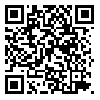Volume 12, Issue 1 (21 2013)
jhosp 2013, 12(1): 57-66 |
Back to browse issues page
Download citation:
BibTeX | RIS | EndNote | Medlars | ProCite | Reference Manager | RefWorks
Send citation to:



BibTeX | RIS | EndNote | Medlars | ProCite | Reference Manager | RefWorks
Send citation to:
Mehdizadeh P, Pourreza A, Allahverdipour H, Dopeykar N. Assessing relationship between job stress, self efficacy and coping among teaching hospitals staff in Tabriz University of Medical sciences in 2009. jhosp 2013; 12 (1) :57-66
URL: http://jhosp.tums.ac.ir/article-1-6-en.html
URL: http://jhosp.tums.ac.ir/article-1-6-en.html
1- Health Management Research Center, Baqiyatallah University of Medical Sciences, Tehran, Iran
2- Department of Health Economics and Management, School of Public Health, Tehran University of Sciences, Tehran, Iran
3- Department of Public Health & Management, Faculty of Health & Nutrition, Tabriz University of Medical Sciences, Tabriz, Iran
4- Department of Health Economics and management, School of Public Health, Tehran University of Medical Sciences, Tehran, Iran ,n.dopeykar@gmail.com
2- Department of Health Economics and Management, School of Public Health, Tehran University of Sciences, Tehran, Iran
3- Department of Public Health & Management, Faculty of Health & Nutrition, Tabriz University of Medical Sciences, Tabriz, Iran
4- Department of Health Economics and management, School of Public Health, Tehran University of Medical Sciences, Tehran, Iran ,
Abstract: (13117 Views)
Background: This study aimed to survey the relationship between job stress, self- efficiency and coping ability among staff of therapeutic- educational hospitals of Tabriz University of Medical sciences.
Materials & Methods: This cross-sectional study was conducted in 2009 among therapeuticeducational hospitals of based on a two stage random sampling. Initially seven hospitals were selected using a simple random method and then 288 persons from the therapeutic and administrative staff were chosen as the sample to be studied using a classified random method. Data were collected using 4 questionnaires titled personal information, self-efficiency, Tores Theorell's job stress scale and Schwarzer's self efficacy and Coping Inventory for Stressful Situation CISS-21 ( Dutch's coping). Data were analyzed Using SPSS software version 11.5 and also Chi-Squared test, T -test, One-Way Anova , Regression analysis and Pearson correlation coefficient.
Results: All the demographic variables including age, gender, marital status, working hours and work experience had a significant relationship with job stress. Pearson correlation test indicated a negative correlation between job stress and self- efficiency, working hours, age and work experience (P<0.001). Additionally there was a positive correlation between self- efficiency and working hours and age and coping ability with work experience ( p< 0.05).
Conclusion: Considering the importance of staff`s mental health issue it is suggested that background factors such as high work load ,dignity level and social value and social supportive programs are taken into close consideration staff`s needs related to these issues are fully satisfied so that better health services are provided.
Materials & Methods: This cross-sectional study was conducted in 2009 among therapeuticeducational hospitals of based on a two stage random sampling. Initially seven hospitals were selected using a simple random method and then 288 persons from the therapeutic and administrative staff were chosen as the sample to be studied using a classified random method. Data were collected using 4 questionnaires titled personal information, self-efficiency, Tores Theorell's job stress scale and Schwarzer's self efficacy and Coping Inventory for Stressful Situation CISS-21 ( Dutch's coping). Data were analyzed Using SPSS software version 11.5 and also Chi-Squared test, T -test, One-Way Anova , Regression analysis and Pearson correlation coefficient.
Results: All the demographic variables including age, gender, marital status, working hours and work experience had a significant relationship with job stress. Pearson correlation test indicated a negative correlation between job stress and self- efficiency, working hours, age and work experience (P<0.001). Additionally there was a positive correlation between self- efficiency and working hours and age and coping ability with work experience ( p< 0.05).
Conclusion: Considering the importance of staff`s mental health issue it is suggested that background factors such as high work load ,dignity level and social value and social supportive programs are taken into close consideration staff`s needs related to these issues are fully satisfied so that better health services are provided.
Received: 2012/05/23 | Accepted: 2012/09/3 | Published: 2013/10/7
Send email to the article author
| Rights and permissions | |
 |
This work is licensed under a Creative Commons Attribution-NonCommercial 4.0 International License. |





